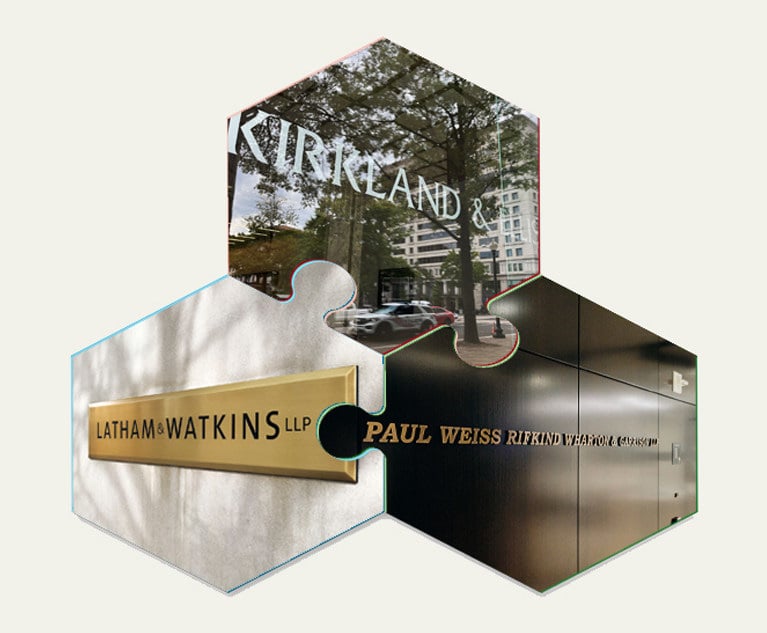What Do Women Want? Law Firms Are Clueless.
Flexible working arrangements, along with women's networking groups and mentoring programs, actually could be cutting against women's advancement.
April 17, 2019 at 04:34 PM
4 minute read
 (Photo: Shutterstock)
(Photo: Shutterstock)
Memo to all you well-meaning law firms out there trying your darnedest to retain and promote women: You are doing it all wrong.
All those marvelous initiatives you've been touting—flexible work arrangements, mentoring programs, affinity groups, transition coaching for new moms and the like—are not getting women out of the rut. Worse, some of those efforts could be making it harder for women to succeed.
That's the deflating, if hardly startling, preliminary finding of a study by Acritas and Thomson Reuters that looked at 40 firms (predominantly U.K.-based) in Europe. As initially reported by Legal Week, the study finds there's a big fat gap between what firms perceive as the fix to the gender problem and what's needed in reality.
For starters, a majority of firms (53 percent) ranked flexibility as the top approach to fixing the gender imbalance problem at their firms.
Why flexibility? Well, it seems firms are making certain assumptions about the tension spots in women's lives. Besides “bias,” firms named “the need for presenteeism” (translation, “face time”) and “the role of women at home in society” as key obstacles, suggesting that women will face conflicts between home and work.
 While it's nice that firms want to help out women with their competing demands, may I just say that I find this presumption of a work-family conflict to be sexist? As I've often noted, it's not as if childless women in Big Law have such an easy time advancing either.
While it's nice that firms want to help out women with their competing demands, may I just say that I find this presumption of a work-family conflict to be sexist? As I've often noted, it's not as if childless women in Big Law have such an easy time advancing either.
Moreover, flexible working arrangements, along with women's networking groups and mentoring programs, could be making women more isolated.
“We're not saying that firms shouldn't offer flexibility,” says Acritas CEO Lisa Hart Shepherd. “The problem is that women are the ones who take it up.”
As for affinity groups, Shepherd says: “Anything that creates silos is bad.” All those closed-door sessions where women vent about their frustrations might not be advancing the issue, because “men have to be part of the solution,” says Shepherd. “If they're opened to men, it becomes part of the positive territory.”
And what about mentoring and sponsorship, which is supposed to be the magic bullet that will catapult women to partnership and other glories?
“Both have roles to play in advancing women, but that's not going to solve the challenges that firms have which are more structural,” says Lucinda Case, managing director at Thomson Reuters.
“There's nothing wrong with mentoring,” adds Shepherd, “but you have to be cautious about what's not working.” She explains: “Mentoring and sponsoring is about fixing women to fit the system, but it's more effective to fix the system.”
Which gets us to what the research says does work to promote gender equality: giving women have equal work opportunities and nipping bias in the bud.
“The firms that do better with women are focused on institutional bias and blind work assignments,” Case says. Without addressing those baseline issue, the other goodies are just throwaways.
“When new matters come in, you have to look at everyone's experience and take out subjective factor in assigning matters,” says Shepherd, adding that both Clifford Chance and Norton Rose Fulbright have introduced “objective assignments.”
What's also essential, she adds, is training for unconscious bias: “Whether it's forced or voluntary, it's had positive impact. When there's sexual harassment and bullying training, there's a better chance you'll create a more fair, far less toxic workplace. The most impactful thing to do is to fix the environment.” (In the survey, only 17 percent of firms identified challenging bias as a top solution to promote gender equality.)
Eliminating unconscious bias, getting rid of favoritism in doling out work and putting the emphasis on fixing the work environment (rather than the women): Uh-oh, that sounds kind of drastic—like a change in culture.
Are firms ready to do that? Or will they just roll out another affinity group?
This content has been archived. It is available through our partners, LexisNexis® and Bloomberg Law.
To view this content, please continue to their sites.
Not a Lexis Subscriber?
Subscribe Now
Not a Bloomberg Law Subscriber?
Subscribe Now
NOT FOR REPRINT
© 2025 ALM Global, LLC, All Rights Reserved. Request academic re-use from www.copyright.com. All other uses, submit a request to [email protected]. For more information visit Asset & Logo Licensing.
You Might Like
View All

Letter from Asia: As American Firms Retreat, Will Loyal UK Firms Regain Market Share In Asia?


Change Is Coming With the New Trump Era. For Big Law, Change Is Already Here
6 minute readTrending Stories
Who Got The Work
J. Brugh Lower of Gibbons has entered an appearance for industrial equipment supplier Devco Corporation in a pending trademark infringement lawsuit. The suit, accusing the defendant of selling knock-off Graco products, was filed Dec. 18 in New Jersey District Court by Rivkin Radler on behalf of Graco Inc. and Graco Minnesota. The case, assigned to U.S. District Judge Zahid N. Quraishi, is 3:24-cv-11294, Graco Inc. et al v. Devco Corporation.
Who Got The Work
Rebecca Maller-Stein and Kent A. Yalowitz of Arnold & Porter Kaye Scholer have entered their appearances for Hanaco Venture Capital and its executives, Lior Prosor and David Frankel, in a pending securities lawsuit. The action, filed on Dec. 24 in New York Southern District Court by Zell, Aron & Co. on behalf of Goldeneye Advisors, accuses the defendants of negligently and fraudulently managing the plaintiff's $1 million investment. The case, assigned to U.S. District Judge Vernon S. Broderick, is 1:24-cv-09918, Goldeneye Advisors, LLC v. Hanaco Venture Capital, Ltd. et al.
Who Got The Work
Attorneys from A&O Shearman has stepped in as defense counsel for Toronto-Dominion Bank and other defendants in a pending securities class action. The suit, filed Dec. 11 in New York Southern District Court by Bleichmar Fonti & Auld, accuses the defendants of concealing the bank's 'pervasive' deficiencies in regards to its compliance with the Bank Secrecy Act and the quality of its anti-money laundering controls. The case, assigned to U.S. District Judge Arun Subramanian, is 1:24-cv-09445, Gonzalez v. The Toronto-Dominion Bank et al.
Who Got The Work
Crown Castle International, a Pennsylvania company providing shared communications infrastructure, has turned to Luke D. Wolf of Gordon Rees Scully Mansukhani to fend off a pending breach-of-contract lawsuit. The court action, filed Nov. 25 in Michigan Eastern District Court by Hooper Hathaway PC on behalf of The Town Residences LLC, accuses Crown Castle of failing to transfer approximately $30,000 in utility payments from T-Mobile in breach of a roof-top lease and assignment agreement. The case, assigned to U.S. District Judge Susan K. Declercq, is 2:24-cv-13131, The Town Residences LLC v. T-Mobile US, Inc. et al.
Who Got The Work
Wilfred P. Coronato and Daniel M. Schwartz of McCarter & English have stepped in as defense counsel to Electrolux Home Products Inc. in a pending product liability lawsuit. The court action, filed Nov. 26 in New York Eastern District Court by Poulos Lopiccolo PC and Nagel Rice LLP on behalf of David Stern, alleges that the defendant's refrigerators’ drawers and shelving repeatedly break and fall apart within months after purchase. The case, assigned to U.S. District Judge Joan M. Azrack, is 2:24-cv-08204, Stern v. Electrolux Home Products, Inc.
Featured Firms
Law Offices of Gary Martin Hays & Associates, P.C.
(470) 294-1674
Law Offices of Mark E. Salomone
(857) 444-6468
Smith & Hassler
(713) 739-1250










